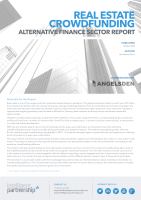
 www.intelligent-partnership.com
www.intelligent-partnership.com
Real Estate Crowdfunding
, ,Alternative Finance Sector Report - October 2014
4
REAL ESTATE CROWDFUNDING
ALTERNATIVE FINANCE SECTOR REPORT
PUBLISHED
October 14
AUTHOR
Samantha Goins
Benefits of Real Estate
Crowdfunding for Investors
Real estate crowdfunding provides
investors with some of the benefits of
both direct and REIT investments. The
first platform dedicated to real estate was
launched in 2010 and many new sites have
entered the market each year since.
The concept is quite simple: platform
members can browse through real
estate investment offerings online to
find opportunities where the location,
property type, entry level, estimated
returns and structure (debt, equity or
co-invest) meet their investment criteria.
They then invest an amount they are
comfortable with, which is then held by
the platform until the fundraising target is
achieved. At this point, legal documents
are drawn up and their investment, along
with everyone else who has invested, is
made available to the borrower.
Investors can either purchase equity,
debt (through the funding of a loan)
or syndicate (co-investment) style
investments. Whether the investment
is in debt, equity or direct ownership,
these platforms allow investors to directly
access to the performance of underlying
real estate assets.
In short, this means that investors can
take advantage of the low entry levels
and easy investment process to achieve a
high level of diversification and minimise
their risk, whilst at the same time retaining
control and visibility of their money and
investing directly without incurring the
charges associated with fund based
investing. REITs typically hold 40 to 60
properties but often only invest in one
sector (residential, commercial etc.),
and are often criticised for having a
lack of transparency when it comes to
their activities. Crowdfunding gives
investors far more control and the ability
to pick and choose investments across
various locations and sectors. Combined
with lower minimum investment and
transaction costs, this makes it easy to
create a balanced and diversified real
estate portfolio.
Real estate crowdfunding also offers
some interesting short–term investment
opportunities. Each investment is
different and timing can range from one
month to several years. Investors can
choose a mixture of long and short-term
opportunities to meet their needs –
providing short-term income and longer-
term capital growth
Benefits of Crowdfunding for
Real Estate Developers
Traditional funding for developers can
be costly, time consuming and limited
to lending institutions such as banks or
hedge funds. These lenders impose tight
restrictions on borrowers, such as strict
scrutiny of plans and tight deadlines
to adhere to. Once they are able to
access the funds, there are expensive
transaction, legal and administration fees
as well as time consuming paper work
and regulations to follow. Since the 2008
financial crisis these institutions have
tightened their lending criteria, restricting
this source of funding. Crowdfunding
offers developers cheaper, faster and
easier access to capital.
A wider audience of investors allows
developers to easily raise financing for
projects. One of the largest platforms in
the US, Fundrise, has 22,721 members
5
Even non-real estate dedicated
platforms are realising the opportunities
for developers and investors. For
example Angels Den, who are already
an established equity crowdfunding
platform have entered the property
market utilising their platform and
database of over registered investors at
the time of writing this report (June 2014).
6,000 investors
6
The internet gives investors access to
their investments 24 hours a day with
everything happening live. Equity-
based crowdfunding opportunities
take on average 8.2 weeks from the
investment first being launched on the
platform to completion, and loan-based
crowdfunding takes just 4.8 weeks on
average
7
. Some platforms even boast
funding projects in under a day!
The cost of raising money through a
platform can also be significantly lower.
The typical crowdfunding platform
charges an initial fee for listing the
project and possible administration fees
to conduct their own due diligence. One
platform, Real Crowd, charges borrowers
a flat fee to gain access to investors and
their ‘Transactions Management Solution’
as well as a monthly fee for their ‘Investor
Management Solution’
8
. As platforms
already have an established investor
base, there is less work spent on investor
management which saves borrowers time
and money.
5 -
https://fundrise.com/
6 -
http://www.angelsden.com/
7
http://www.crowdfunding.nl/wp-content/uploads/2012/05/92834651-Massolution-abridged-Crowd-Funding-Industry-Report1.pdf8 -
https://www.realcrowd.com/operator/landingPlatform Locations
To date the majority of real estate crowdfunding investment has occurred in the US and UK where there are several established
platforms operating such as Fundrise, Realty Mogul , Assetz Capital and iFunding. Other crowdfunding platforms in the UK are
expanding their investment offerings to include real estate.
“There is a missing link as banks have pulled out of mezzanine funding and now leaves the door open for HNW individuals to fill the
gap. We are speaking to a number of UK property developers who are very keen to open up this form of equity crowdfunding system.”
Gary Stern, Angels Den
These platforms focus on investments located in specific areas in order to capture regional benefits leveraging their previous
experience in the region and their relationships with local developers and investment providers. The Asian market is well suited to
this new avenue for investment as the real estate market is buoyant, entry levels are high and investors are looking for new ways to
access the sector.
















